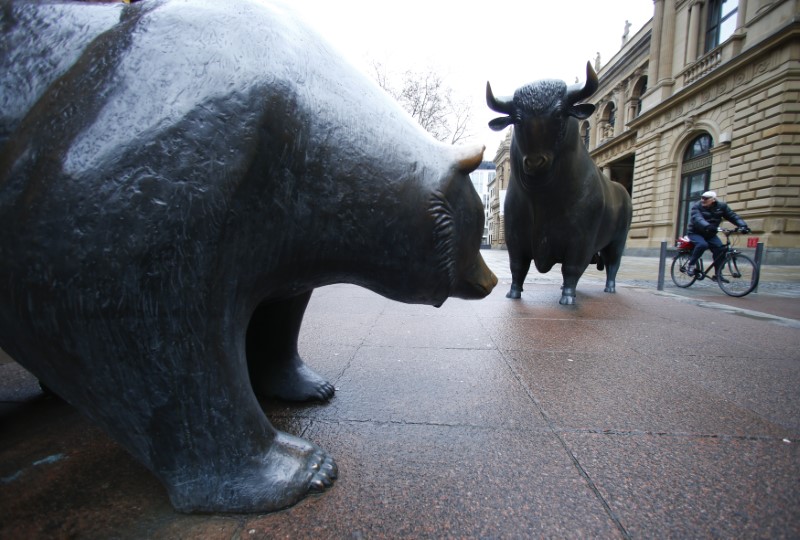By Max Bower
LONDON (LPC) - Senior participants are warning that today’s market could be as good as it gets, despite a robust global economic backdrop and buoyant mood in the private equity and leveraged loan markets.
Comparisions to 2007's pre-crisis conditions are becoming more common and industry figures are debating whether today's robust conditions constitute a bubble, as purchase prices rise, jumbo buyouts proliferate and deal terms become more aggressive.
"I think we're now in bubble territory," said Frode Strand-Nielsen, founder of Nordic private equity firm FSN Capital.
Leveraged buyout purchase price multiples hit a record high of 11.2 times average Ebitda in 2017 and average buyout sizes also hit a new record of US$675m in the third quarter of 2017, up from 10 times in 2016, according to a recent report by Bain & Co.
Increasingly large buyout loans have been announced this year, including Blackstone’s US$20bn buyout of Thomson Reuters’ Financial and Risk division (TO:TRI), and the upcoming €10bn carve-out of Akzo Nobel’s specialty chemicals division.
Blackstone (NYSE:BX) is buying a 55% stake in Thomson Reuters’ Financial and Risk unit, which includes LPC.
Strong debt markets are currently seeing good investor demand, but private equity firms are targeting companies that they can take through a recession, Gregor Bohm, co-head of Carlyle’s European buyout business, said at Berlin’s SuperReturn conference.
“You have to sell all the companies that you don’t want to hold through a recession,” he said.
The next five years could be a difficult environment for private equity and leveraged credits, Strand-Nielsen said, particularly as buyouts that have been financed with cheap debt will get more expensive if interest rates rise.
“There’s a lot of financial engineering, which usually indicates we’re going into a concerning environment,” he said at SuperReturn.
The spectre of monetary tightening as the European Central Bank ends its Quantitative Easing programme is consistently highlighted as the biggest risk facing the market this year, among many, as global tensions rise.
SAME BUT DIFFERENT?
While private equity firms and bankers are aware that they are at the top of the market, benign borrowing conditions could persist for some time, allowing borrowers to lock in cheap debt.
“Borrowers are enjoying peak funding conditions,” said Ed Eyerman, head of European leveraged finance at Fitch in London.
Comparisons with 2007 overlook the fact that the leveraged loan market has fundamentally changed due to covenant lite lending - which did not exist a decade ago - and a larger and more diverse institutional buyside.
Although the lack of covenants is causing concern, bankers point to Spanish fashion retailer Cortefiel's [CTRFL.UL] 2014 amendment and extension of €1.4bn of debt and 25% covenant headroom increase.
This bought time for the operating business to improve and allowed Cortefiel to return to the debt markets last year, but other companies may not be so lucky.
"Cortefiel was the poster child for cov-lite lending but you can’t assume all will do that well,” a market analyst said.
Co-president Scott Sperling said that Thomas H. Lee Partners is focusing on less cyclical growth businesses which are better positioned to weather a downturn that could have a similar magnitude to the last financial crisis.
“It’s certainly not a brave new world that includes no cycle,” he said. “Our base case incorporates a recession of the size of 2008. The swings can be reasonably violent so you have to recognise how that could affect capital structures.”
CORRECTION INEVITABLE?
The global macroeconomic backdrop is also stronger than 2007 and private equity firms are continuing to benefit from broad-based global economic growth, Sperling and Eyerman said.
Interest rates are rising, but are expected to stay lower for longer than before the financial crisis, which is unlikely to affect companies’ debt-servicing ability in the short term.
Fixed charge cover ratios, which measure how comfortably businesses can meet operating costs, are also higher in leveraged companies than before the crisis.
The type of companies borrowing has also changed with the rise of software and business services with fewer assets and higher free cash flow margins, that require less onerous credit protections, Eyerman said.
“They don’t have the capex and fixed costs of pre-2007 leveraged credits in sectors such as auto supply and building materials,” he said.
Despite lower debt servicing costs, some still think the market's record nine-year bull run is simply be delaying the inevitable correction, which will only make it more painful.
"We’re watching a movie where we know what the ending is,” said Guthrie Stewart, global head of private investments at PSP Investments. “Just not how long it is until we get there.”
